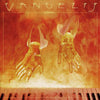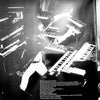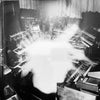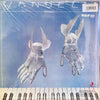







Vangelis - Heaven And Hell
Vangelis - keyboards, percussions
Jon Anderson and the English Chamber Choir - vocals
Written by Vangelis (A1, A2, B1), Jon Anderson (A1, B1)
1 LP, gatefold sleeve
Original analog Master tape : YES
Heavy Press : 180g
Record color : black
Speed : 33 RPM
Size : 12'’
Stereo
Studio
Record Press : Pallas
Label : Speakers Corner
Original Label : RCA
Recording: September 1975 at Nemo Studios, London, by Alan Lucas
Production: Vangelis
Originally released in 1975
Reissued in 2018
Tracks :
Side A :
Side B :
1. Heaven And Hell (Part 2)
Reviews :
« Those used to Vangelis' later and lighter synthesized outings may not be quite ready for this dark, thundering album. While it did provide us with the theme music for the TV series Cosmos and bring Jon Anderson into partnership with Vangelis (following an abortive approach to Vangelis joining Yes) on "So Long Ago, So Clear," it also served up massed Gothic choirs and a musical depiction of all the tortures of the damned, with an impressive amount of string-driven shrieking. Even so, it's a brilliant piece of work that should not be absent from any Vangelis collection. » AllMusic Review by Steven McDonald
Technical innovations in musical instruments and the development of tonal language have been continual subjects for deliberation from the 19th century onwards at the latest. Additional brain power is necessary to conciliate the two elements with the endless possibilities of electronic sound. In the end, the two factions cannot resolve on a conclusive opinion and the question remains as to whether art always results from skill.
Evángelos Odysséas Papathanassíou, or Vangelis for short, always worked with the newest synthesizer equipment and pushed his cascades of sound to the very edge, right up to the point of electronic overkill. In contrast to many other electronics experimentalists of his time, Vangelis likes to »create important melodies and to develop them further, without going under in the technical equipment« (Stereo Review). Distant human voices, siren-like lost calls lead into oriental dance.
A song – far removed from its era – somewhere between Gregorian music and antiphony – a will-o‘-the-wisp, shimmering sound. Polyphonic playing on the Bösendorfer reminds one that every form of musical expression from over the sands of time is welcome. Each listener must discover for himself what sounds heavenly or hellish. But let it be said: musically speaking, the one cannot be imagined without the other.
Ratings :
AllMusic : 4.5 / 5 , Discogs : Rate Your Music :


